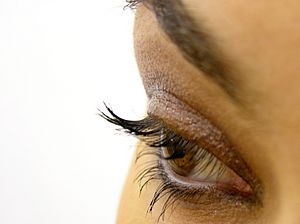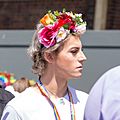Femininity facts for kids

Femininity refers to a group of qualities, actions, and roles often linked with females. It includes things shaped by society and also some biological factors. This is different from simply being biologically female. People of any gender, including women, men, and transgender people, can show feminine qualities.
Contents
What is Femininity?
Femininity describes traits and behaviors that are traditionally seen as female. These can include being gentle, caring, or expressive. It is not just about being born female. It is more about how a person acts and expresses themselves.
Femininity and Society
What is considered feminine can change a lot. It depends on the culture and the time period. Society plays a big role in shaping these ideas. For example, some cultures might see certain clothing or hairstyles as feminine. Others might focus on specific jobs or hobbies.
How Culture Shapes Femininity
Different cultures have different ideas about femininity. In some places, being feminine might mean being quiet and polite. In other places, it might mean being strong and artistic. These ideas are taught through families, schools, and media. They help people understand what is expected of them.
Femininity and Gender
It is important to know that femininity is not the same as being female. A person's biological sex is about their body. Their gender identity is how they feel inside. Femininity is about expressing certain qualities. Both boys and girls, men and women, can show feminine traits.
Expressing Femininity
Many people express femininity in different ways. This could be through their clothes, their hobbies, or how they interact with others. For example, someone might enjoy wearing dresses or makeup. Another person might show femininity by being very nurturing or empathetic. These are all ways to express feminine qualities.
How Femininity Changes Over Time
Ideas about femininity have changed a lot throughout history. What was seen as feminine 100 years ago might be different today. For instance, in the past, women often wore long skirts. Now, women wear many different styles. Jobs once seen as only for men or women have also changed. This shows that femininity is not fixed. It evolves with society.
Examples of Changing Ideas
In the 1800s, it was very feminine for women to stay home. They often focused on raising children. Today, it is common for women to have careers outside the home. This shift shows how roles linked to femininity can adapt. It reflects changes in how society views women and their capabilities.
See also
 In Spanish: Feminidad para niños
In Spanish: Feminidad para niños
Images for kids
-
Young Woman Drawing (1801, Metropolitan Museum of Art) painted by Marie-Denise Villers (possibly a self-portrait), depicts an independent feminine spirit.
-
Teacher in a classroom in Madagascar (c. 2008). Primary and secondary school teaching is often considered a feminine occupation.
 | Janet Taylor Pickett |
 | Synthia Saint James |
 | Howardena Pindell |
 | Faith Ringgold |






